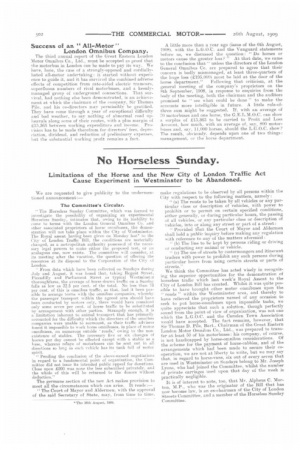No Horseless Sunday.
Page 2

If you've noticed an error in this article please click here to report it so we can fix it.
Limitations of the Horse and the New City of London Traffic Act Cause Experiment in Westminster to be Abandoned.
We are requested to give publicity to the undermentioned announcement:— The Committee's Circular.
" The Horseless Sunday Committee, which was formed to investigate the possibility of organizing an experimental Horseless Sunday, intimates that, owing to its inability to come to terms with the London General Omnibus Co. and other associated proprietors of horse omnibuses, the demonstration will not take place within the City of Westminster. The Royal assent having been given on Monday last* to the City. of London Traffic Bill, the conditions are materially changed, as a metropolitan authority possessed of the necessary legal powers to make either the proposed test, or en analogous one, now exists. The committee will consider, at its meeting after the vacation, the question of offering the resources at its disposal to the Corporation of the City (..f London.
" From data which have been collected on Sundays dining July and August, it was found that, Lakin:: Regent Street, Piccadilly and Parliament Street as typical Westrninstr thoroughfares, the average of horse-drawn traffic on a Sunday falls as low as 32.5 per cent, of the total. No less than 78 per cent, of this is omnibus traffic, so that, had it been seeeible to arrange terms with the omnibus companies, whereby the passenger transport within the agreed area should have been conducted by motors only, there would have remained only some seven per cent. of horse traffic to be substituted by arrangement with other parties. Strangely enough, it is arlimitation inherent to animal transport that has primarily accounted for the difficulty which the directors of the omnibus companies were unable to surmount, as their traffic advisers found it impossible to work horse omnibuses, in place of motor omnibuses, on numerous outside roads,' owing to the nonexistence of stables. The necessary five or six changes of horses per day cannot be effected except with a stable as a base, whereas relays of motorbuses can be sent out in all directions so long as each vehicle has its tank full of motor spirit. " Pending the conclusion of the above-named negotiations in regard to a fundamental point of organization, the Corne mittee did not issue its intended public appeal for donations. Close upon £200 was none the less subscribed privately, and the whole of this will be returned to the donors without deduction."
The germane section of the new Act makes provision to meet all the circumstances which can arise. It reads:—
" The Court of Mayor and Aldermen, with the approval of the said Secretary of State, may, from time to time, make regulations to be observed by all persons within the City with respect to the following matters, namely : " (a) The route to be taken by all vehicles or any particular class or description of vehicles, with power to prohibit or to permit on certain specified conditions, either generally, or during particular hours, the passing of all vehicles, or any particular class or description of vehicles, into or along any street or part of a street :
" Provided AA the Court of Mayor and Aldermen shall hold a public inquiry before making any regulation with reference to any of the matters aforesaid : " (b) The line to be kept by persons riding or driving or conducting any animal or vehicle. " (c) The use of streets by costermungers and itinerant traders with power to prohibit any such persons during particular hours from using certain streets or parts of streets."
We think the Committee has acted wisely in recognizing the superior opportunities for the demonstration of horselem traffic which last week's Royal Assent to the City of London Bill has created. Whilst it was quite possible to have brought other motor omnibuses upon the " roads " within the -Westminster area, and thereby to have relieved the proprietors named of any occasion to seek to put horse-omnibuses upon impossible tasks, we quite appreciate that such a solution, though perfectly sound from the point of view of organization, was not one which the L.G.O.C. and the Camden Town Association would have accepted. The fact remains, however, that Sir Thomas D. Pile, Bart., Chairman of the Great Eastern London Motor Omnibus Co., Ltd., was prepared to transfer at least 50 of his motorbuses: his company, of course, is not handicapped by horse-omnibus considerations. Of the scheme for the payment of horse-cabbies, and of the arrangements which had been made to secure their cooperation, we are not at liberty to write, but we may say that, in regard to horse-vans, six out of every seven that are used in Westminster on Sundays belong to Mr. Joseph Lyons, who had joined the Committee, whilst the number of private carriages used upon that day of the week is practically negligible.
It is of interest to note, too, that Mr. Alpheus C. Morton, M.P., who was the originator of the Bill that has now become law, is an ex-chairman of the City of London Streets Committee, and a member of the Horseless Sunday Committee.






















